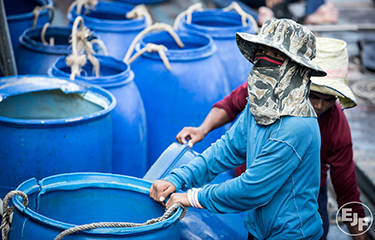Few buyers of seafood from Thailand are building the cost of social and environmental compliance into the prices they’re paying, undermining efforts to keep slavery and other labor abuse issues out of the supply chain, according to a new report from Praxis Labs, funded by the non-governmental organizations Humanity United and the Freedom Fund.
The report, “Tracking Progress: Assessing Business Responses to Forced Labour and Human Trafficking in the Thai Seafood Industry,” investigated how industry responded to the exposure of labor and human rights abuses in the Thai seafood sector, which were exposed in the past five years by The Associated Press and The Guardian.
According to the report, many international brands and retailers refuse to pay their suppliers more to comply with new anti-slavery policies put into place by the Thai government.
“The disconnect between what buyers purport to want and what they’re willing to pay ... comes through sharply,” Freedom Fund Senior Program Manager Sarah Mount told Reuters.
The study looked into the policies and actions of 28 companies buying seafood from Thai suppliers. After the Guardian and AP investigations, while many of those companies issued public statements asserting they would stand by their suppliers as they sought to improve their practices, the reality has been that suppliers have not financially supported the sector to help it make changes, according to the report.
“Thai suppliers note haphazard financial support for social auditing but none for improving working conditions and report no increase in price,” the report said.
The Thai Department of Fisheries said the costs of labor audits and sustainability certification have been prohibitive for small-scale fisheries that do not receive support from their buyers. Suppliers wary of being dependent on one buyer only are required to invest in multiple audits and certification labels, adding to their expenses, the report discovered.
“Asserting a commitment to stand by suppliers to improve labor conditions rather than abandoning the commercial relationship on the basis of human rights abuse, then transferring business to cheaper suppliers when the costs of complying with Thai law and buyer standards increase production costs, is an inherent contradiction that needs to be addressed,” it said.
Making matters worse, many buyers are reducing their purchases from Thai suppliers or abandoning the Thai market altogether, as many suppliers reported a decline in sales, particularly of shrimp. Price competition appears to be the primary factor, with lower production due to the shrimp disease EMS cited as a secondary factor. But costs of production have been rising due to legal requirements and buyer demands and legal requirements for sustainability commitments such as end-to-end traceability.
“Pushing down demands for social and environmental compliance while simultaneously seeking cheaper prices is an unviable business model that forces suppliers to contend with increased production costs in the face of smaller margins, which in the case of seafood is compounded by the dwindling fish stocks and decline in the value of the catch landed,” the report said. “These costs have to be borne somewhere by someone. Thus, not only does the current business model hamper efforts to end labour abuse, it is a key factor in the perpetuation of forced labor.”
The report also looked into labor conditions in the Thai seafood industry; the response of the Seafood Task Force, which has taken the lead on driving reform in Thailand’s seafood sector; and the role governments can play in combating labor abuses in Thailand and in the broader seafood industry.
However, for companies buying seafood from Thailand, paying a price that allows companies to afford the higher cost of fair labor is the primary solution targeted by the report.
“Until the costs associated with ethical sourcing are built into the product price, the current business model based on high volume at low price remains an inherent challenge to advancing human rights in seafood supply chains,” the report said.
Photo courtesy of Environmental Justice Foundation







